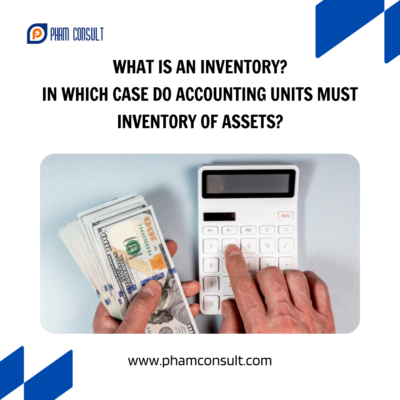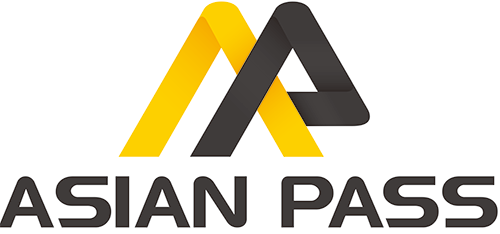Inventory is a job that accountants and every business must do regularly at the end of each period. Through today’s article, let’s learn with Pham Consult about cases where accounting units must inventory assets!

1. What is inventory?
Inventory is the determination of the quantity, value, and condition of assets, goods, tools, etc. at a certain time. Inventory is an important job in accounting, helping businesses grasp the actual situation of assets, goods, etc. to promptly adjust and overcome shortcomings and errors in management.
In accounting, there are two main inventory methods, including:
Periodic inventory
Is the inventory of assets, goods, etc. periodically, usually annually or according to the business cycle. Periodic inventory helps businesses determine fluctuations in assets, goods, etc. over a certain period of time.
Unscheduled inventory
Is the inventory of assets, goods, etc. not periodically, but done when there is a need, such as when there is a change in organizational structure, when a natural disaster, fire, etc. occurs. Unscheduled inventory helps businesses grasp the actual situation of assets, goods, etc. in a timely manner.
In addition, in accounting there are a number of other inventory methods, including:
Complete inventory
Is an inventory of all assets, goods, etc. of a business. A complete inventory is often performed when a business has a change in organizational structure, when a natural disaster, fire, etc. occurs.
Inventory and sample selection
Is an inventory of a number of assets, goods,… representing all assets, goods,… of an enterprise. Sampling inventory is often performed when a business has a large amount of assets, goods, etc., which is difficult to fully inventory.
Inventory by machine
Is the use of modern machinery and technology to inventory assets, goods, etc. Machine inventory helps businesses inventory quickly and accurately, minimizing errors.
According to the provisions of Clause 2, Article 40 of the 2015 Accounting Law, the accounting unit must inventory assets in the following cases:
– At the end of the annual accounting period.
– The accounting unit is divided, separated, consolidated, merged, dissolved, terminated, bankrupted, or sold or leased.
– The accounting unit is converted into type or form of ownership.
– Fires, floods and other unusual damages occur.
– Reassess assets according to decisions of competent state agencies.
– Other cases as prescribed by law.
Note: After inventorying assets, the accounting unit must prepare a report summarizing the results of the inventory.
In case there is a difference between the actual inventory data and the data recorded in the accounting books, the accounting unit must determine the cause and must reflect the difference and the results of handling in the accounting books before preparing the report. financial statements.
2. Will the accounting unit be fined if it does not conduct an asset inventory?
The level of administrative penalties for accounting units that fail to conduct asset inventory is specified in Clause 2, Article 16 of Decree 41/2018/ND-CP as follows:
Penalties for violations of regulations on asset inventory
1. Fine from 1,000,000 VND to 2,000,000 VND for one of the following acts:
a) Failure to prepare a summary report on inventory results or a report on inventory results that does not have all signatures as prescribed;
b) Does not reflect the difference and the results of handling the difference between the actual inventory data and the accounting book data.
2. Fine from 3,000,000 VND to 5,000,000 VND for failure to conduct asset inventory according to regulations.
According to Clause 2, Article 6 of Decree 41/2018/ND-CP, amended by Clause 2, Article 5 of Decree 102/2021/ND-CP, the fines are prescribed as follows:
Fines in the field of accounting and independent auditing
…
2. The fine levels specified in Chapter II and Chapter III of this Decree are the fine levels applicable to organizations except for the cases specified in Clause 1, Article 7; Article 8; Article 9; Article 10; Article 11; Article 13; Article 14; Article 15; Article 16; Article 17; Article 19; Clause 1, Clause 3, Article 21; Article 22; Article 23; Article 24; Article 26; Article 33; Article 34; Clause 1, Clause 3, Article 36; Clause 1, Article 38; Clause 2, Clause 3, Article 39; Clause 1, Clause 2, Article 48; Clause 1, Article 57; Clause 1, Clause 2, Article 61; Article 67 is the fine level for individuals. For organizations that commit the same violation, the fine is 2 times the fine for individuals.
…
According to the above regulations, an accounting unit that does not conduct an asset inventory according to regulations may be subject to administrative sanctions with a fine ranging from 6,000,000 VND to 10,000,000 VND.
3. What is the statute of limitations for sanctioning administrative violations against accounting units that do not conduct asset inventory?
Pursuant to Clause 1 and Clause 2, Article 3 of Decree 41/2018/ND-CP, amended by Clause 1, Article 5 of Decree 102/2021/ND-CP, regulations on the statute of limitations for sanctioning administrative violations are as follows:
Statute of limitations for sanctioning administrative violations
1. The statute of limitations for sanctioning administrative violations in the field of accounting is 2 years.
2. The statute of limitations for sanctioning administrative violations in the field of independent auditing is 1 year.
3. The time to calculate the statute of limitations for sanctioning administrative violations in the field of accounting and independent auditing is prescribed as follows:
a) For administrative violations that have ended, the statute of limitations is calculated from the time the violation ended;
b) For administrative violations being committed, the statute of limitations is calculated from the time the violation is discovered;
c) For violations of accounting and independent auditing specified in this Decree, the time of termination of the administrative violation to calculate the statute of limitations for sanction is:
– The time the organization or individual completes the professional process and work requirements according to the provisions of law on accounting and independent auditing;
– The time when an organization or individual stops a violation to comply with the provisions of law on accounting and auditing.
d) To consider whether an administrative violation has ended or is in progress, in addition to based on point c above, agencies and persons with authority to sanction administrative violations shall base on the provisions of law on accounting, independent auditing, records, documents and details of each specific case to determine whether the violation has ended or the violation is in progress.
…
Thus, the statute of limitations for sanctioning administrative violations against accounting units that do not conduct asset inventory is 02 years.
Thus, through the article on Pham Consult, we have helped you learn more new information about cases where accounting units must inventory assets. Hope the above information will help your work.
Comments




 VI
VI